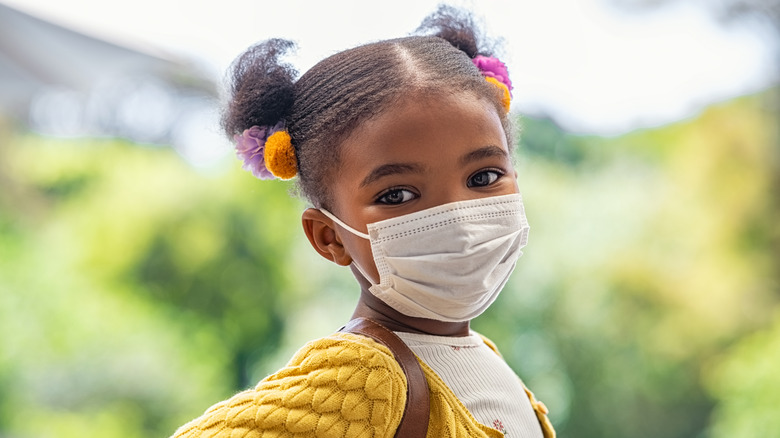SonderMind's Dr. Doug Newton On Mental Health Tips For The Upcoming School Year - Exclusive Interview
Back-to-school time can be a stressful period for kids, parents, and teachers — especially now with the pandemic and the seemingly constant news of school shootings. "So much of the school experience has changed through the COVID pandemic, and we are all a little more on edge about what unknown things could happen this year," says Dr. Doug Newton, Chief Medical Officer at SonderMind, a mental health service.
SonderMind helps people connect with a licensed therapist for online video or in-person therapy sessions. Their network of licensed mental healthcare professionals covers a wide variety of mental health issues and practice areas. They match you based on specialty, availability, location, treatment approaches, insurance, and more.
Dr. Newton holds a Doctor of Medicine from the University of Wisconsin and a Master of Public Health degree from Yale University. In an exclusive interview with Health Digest, he shared advice for how students, teachers, and parents can mentally and emotionally prepare for the upcoming school year, including tips for how to cope with stress, fear, and anxiety.
Anxiety about back-to-school time is on the rise
Can you share with us a little about your background and involvement in SonderMind?
As Chief Medical Officer, I drive all clinical quality and education for SonderMind's providers and clients. This includes leading a team of clinicians and researchers to ensure we meet our mission of providing faster access to the right therapist to help a client, appropriate utilization throughout a therapeutic journey, and improved outcomes for thousands of individuals. Along the way, I'm also focused on supporting our providers to be their best professional selves.
With the new school year about to begin, are you seeing an increase in anxiety from parents, students, and teachers about going back to school?
Yes. Around this time every year, we see students, as well as parents and teachers, having increased worries about how the impending school year will go. So much of the school experience has changed through the COVID pandemic, and we are all a little more on edge about what unknown things could happen this year. A recent study from the Centers for Disease Control and Prevention (CDC) stated that one-third of parents of high schoolers said that their child has recently shown symptoms of mental health issues, including anxiety (19%) and depression (13%). Now more than ever, we need to be there for our children.
Mentally preparing for the new school year
As COVID cases continue to rise, how can students, teachers, and parents mentally and emotionally prepare for the upcoming school year?
First, it is important for parents and teachers to help children and teenagers identify and manage their emotions. I recommend starting with the following:
1. Help children and teenagers identify and name feelings. Are they feeling excited about the upcoming school year? Or are they more scared and anxious? At a young age, it is hard for kids to identify their exact emotion, so talking it out with them can help materialize what is really going on in them.
2. Normalize the situation and understand you are not alone. Despite the increase of social media in our daily lives that can connect us to others around the world, people of all ages are feeling more alone than ever, which increases feelings of anxiety and depression. It is important for all of us — parents, teachers, and children — to understand and hear from loved ones and other trusted individuals that we are not alone and that these feelings are completely normal this time of year.
3. Recognize that often, anxiety and fear come from feeling a lack of control. What can you put in your control? If your child is worried about making new friends, think about how you can help them practice what to say on the playground or how to approach someone for the first time. Helping your child understand what is actually in their control can help curb their feelings of fear and anxiety.
4. At the same time, find ways to distract from what is not in our control. We can't imagine every possible scenario that we might run into on the first day of school, so it is important to identify what we can control and distract ourselves from what we have no say in.
5. Recognize feelings in others. I love the phrase "compassion is more contagious than COVID." All of us need to be on the lookout for friends and family members who seem to be struggling and do our best to be there for them.
Tips for school shooting-related anxiety
The tragedy at Uvalde marked the 27th school shooting for the 2022 school year. How can teachers and students cope with fear and anxiety related to these events?
According to the National Child Traumatic Stress Network, children's and teens' reactions to school shootings are strongly influenced by how parents, relatives, teachers, and other caregivers respond to the event. Despite how much anxiety we are feeling, we must be good mental health role models for our children, taking care of ourselves so we can take care of them.
This may mean limiting our access to the news and social media or giving ourselves a break and going for a walk. I highly recommend that parents and teachers talk to a therapist about their own feelings of anxiety and fear around school shootings. If you're better mentally equipped to face the new school year, your child will be as well.
When it comes to talking to our children about school shootings, first, it is incredibly important to reassure children that they are safe: Schools are a safe place. That is not to minimize their fears. Validate that it is okay to be scared, but emphasize that school buildings and grounds are overall safe and secure places to learn and grow.
Secondly, talk to your child honestly about their fears of school shootings, but make sure it is appropriate for their age level and development. For elementary school-aged children, I recommend sharing the least amount of details. Be brief and simple in your conversations, giving basic reassurances. For middle school, you should start with understanding what your child knows, correct any potential misunderstandings, and reassure them it is okay to talk about their fears.
By middle and high school, children may not feel as comfortable acknowledging or communicating their fears. Let them know they are safe at school and safe to talk about their feelings. High schoolers may have stronger opinions about shootings and tragedies. Be prepared to have nuanced, sophisticated conversations about the impact of gun violence not just on them but on their community and society as a whole.
How parents can help prepare for back-to-school
What advice do you have for parents to mentally prepare for this school year?
I recommend that parents keep a regular daily schedule. Try to get into the swing of things a week before the school year starts, waking everyone up around the same time, having breakfast together, going to bed at a decent hour. Consistency leading up to school starting will help reduce anxiety.
Also, make sure to stay connected with family and friends. This time of year can feel busier than ever, and in turn, make us feel more isolated. Check in with your friends and family, see if they are going through what you are, and share ideas for how you can do better and feel better.
I also remind parents to recognize the three A's and three F's in their child and themselves.
Avoidance: For some, the longer we are out of school or activities, the greater avoidant behaviors can become. This can be what's in children's or teenagers' heads as well when it comes to social interactions, school, or being in any public spaces.
Ambivalence: Kids have a hard time making decisions as it is. When kids are stressed or anxious, they overthink. This can lead to "analysis paralysis," which can result in poor decision-making and ineffective learning.
Anticipation: These are the constant "what-ifs" and "what happens when?" Anticipating a stressful event is often more stressful than the event. This is especially true when there are so many unknowns. There is so much we don't know about school this fall. Starting the school year can be anxiety-provoking in the best of circumstances.
Flight: As a parent, re-engaging in academic responsibility can trigger a whole host of emotions, and there are plenty of things that make us want to run away. Sometimes this is a good thing, like when we run from danger, but sometimes it can be running from important feelings that we need to talk about and validate.
Freeze: There may also be a "freeze effect" where you don't do anything. You fight the urge to crawl up in a ball and watch all-day reruns of Friends, or your child wants to watch Bluey all day.
Fight: If all else fails, we fight our way out. You can see and hear this everywhere on the news with increasing anger and resentment on a global scale. The "fight" and fear often fuels discord in the family and evokes civil unrest in our communities.
Once you recognize the 3 A's and 3 F's in yourself and your child, you can better support them by seeking help to address the issues you face.
Supporting your mental health
What are some simple yet effective healthy mental hygiene habits students can incorporate into their daily lives? What about for teachers and parents?
First, check your own head. What I mean by this is assessing your own level of anxiety or stress as you juggle more and have less clarity on what's to come. Make sure you stay connected to friends and loved ones, because isolation and loneliness are real and add to our stress.
Also, make sure to carve out your own time for relaxation or rejuvenation and for exercise. Even 30 minutes a day of low-impact exercise has been shown to significantly reduce stress. If you have tried to do it on your own but are still struggling emotionally, please reach out to a professional. There are professionals that can help, even if you don't have insurance, and many are now doing telehealth from the convenience of your own home or office like we are at SonderMind.
SonderMind helps people connect with a licensed therapist for online video or in-person therapy sessions and is making it easier for people to access, receive, and participate in mental healthcare.
This interview was edited for clarity.






